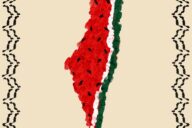Mahfuz, Naguib, Children of Gebelawi, trad. D. G. Villaescusa, Madrid, Martínez Roca, 2006.
Naguib Mahfuz (1911-2006), Nobel Prize in Literature, published in 1959 Children of Gebelawi (أولاد حارتنا), a novel characterized by symbolism and metaphysical perspective [1]. The text refers to a Cairo neighborhood and its inhabitants, descendants of the same progenitor, Gabalaui, who could be understood as a representation of God. In structural terms, the book is divided into five chapters that deal with the misery and injustice prevailing in the neighborhood from prehistoric times to the present day, and introduce the story of Adham (Adam), Gabal (Moses), Rifaa (Jesus), Qasem (Muhammad) and Arafa (science, knowledge in Arabic أعرف).
The work has almost always been analyzed in a religious or political light, being both controversial and banned from sale in many Arab countries. Mahfuz never revealed a correct interpretation of his work, he only pointed out the multiplicity of symbols and the freedom of their interpretation, defining himself as an artist and a fiction writer, not as a historian or a theologian [2]. In the prologue, Mahfuz declares, based on an anonymous narrator born in Arafa’s time, that the book intends to narrate the “history of our neighborhood” as accurately as possible, without confusing information and without sympathies of any kind. In the prologue, Mahfuz declares, based on an anonymous narrator born in Arafa’s time, that the book intends to narrate the “history of our neighborhood” as accurately as possible, without confusing information and without sympathies of any kind.
Children of Gebelawi is an artistic expression that offers a reconstruction of the past, promoting an allegorical reading of reality and raising reflections on the most transcendental issues of humanity.
The historical importance of the past and the construction of memory is a constant in the work. This materialized, for example, in the character of the poets, who come to the cafés every night to tell the stories of the neighborhood, singing verses about the justice and goodness of Gabalaui as well as praising the administrator and the chiefs, despite their tyranny. The neighborhood is gradually divided into sectors as rebellions for liberation from oppression and injustice take place: “those of Gabal, those of Rifaa and those of Qasem”, easily identifiable with Judaism, Christianity and Islam. In each sector, the poets keep using literature and music to tell the legends of their ancestors, thereby consolidating a certain interpretation of history and contributing to the generation of different collective identities based on the importance of heritage. Children of Gebelawi is, like the stories of the poets in the cafés, an artistic expression that offers a reconstruction of the past, promoting an allegorical reading of reality and raising reflections on the most transcendental issues of humanity.
 One of the main reflections of the work revolves around the failure of the revolutions of the protagonists. At the beginning of each chapter, Adham, Gabal, Rifaa, Qasem and Arafa, respectively, succeed in putting an end to the previous corruption and establishing a period of peace and stability in the neighborhood. However, corruption and tyranny soon emerge again, at the hands of the thugs, the chief and the administrator of the neighborhood, who possess the force and the habiz assets, the usufructs of the neighborhood delegated by Gabalaui. This consideration is important, especially because of its parallelism with the historical and current reality. On many occasions and in many Arab countries it has been possible to observe this cycle in which, although peace and social stability have been achieved at certain moments, degeneration soon emerges, which seems to converge with Mahfuz’s pessimism regarding the persistence of oppression and social injustice in society.
One of the main reflections of the work revolves around the failure of the revolutions of the protagonists. At the beginning of each chapter, Adham, Gabal, Rifaa, Qasem and Arafa, respectively, succeed in putting an end to the previous corruption and establishing a period of peace and stability in the neighborhood. However, corruption and tyranny soon emerge again, at the hands of the thugs, the chief and the administrator of the neighborhood, who possess the force and the habiz assets, the usufructs of the neighborhood delegated by Gabalaui. This consideration is important, especially because of its parallelism with the historical and current reality. On many occasions and in many Arab countries it has been possible to observe this cycle in which, although peace and social stability have been achieved at certain moments, degeneration soon emerges, which seems to converge with Mahfuz’s pessimism regarding the persistence of oppression and social injustice in society.
The work places at the center of the success of the rebellions the religious values of equality, peaceful coexistence and social justice, and criticizes their socio-political outcome in the medium-long term, as the new social order becomes corrupted very quickly when it approaches power. The last chapter of the work redirects this critique to science, as a contemporary paradigm of approaching truth. Although Arafa initially presented his discoveries in the name of progress and development, he quickly sold out to the administrator, with both of them dividing up the habiz assets at the expense of the misery of the people of the neighborhood, and making evil use of Arafa’s discoveries, such as the creation of explosive weapons.
Religions, as well as any other philosophical and ethical system, have a crucial importance in promoting universal values around equality, plural coexistence and social peace.
Mahfuz’s work is absolutely relevant and reflects not only the story of an Egyptian neighborhood, but also the contemporary global reality. Today, despite scientific and technological advances, as well as the considerable economic growth that the world has been experiencing since the Industrial Revolution, poverty and inequality have not only remained unchanged, but have increased significantly. 76% of the world’s wealth corresponds to 10% of the population, while the poorest 50% of the population owns only 2% of the total wealth [3].
Children of Gebelawi induces a reflection that allows to think that, beyond religions and science, peace and social prosperity do not derive from a certain paradigm of knowledge that reveals itself as the authentic and real one, but from the individual and collective agency for social progress and human welfare, as the protagonists of this novel did. In this exercise, religions, as well as any other philosophical and ethical system, have a crucial importance in promoting universal values around equality, plural coexistence and social peace.
Ainara García Sánchez
References
[1] Del Amo M. (1996): “Naŷīb Maḥfūẓ: del realismo al simbolismo”, Miscelánea de Estudios Árabes y Hebraicos. Sección Árabe-Islam, 450, pp. 15-24. Disponible en: https://revistaseug.ugr.es/index.php/meaharabe/article/view/14488 [Consulta: 28 de diciembre de 2022].
[2] Stagh, M. (1993): The limits of freedom of speech. Prose literature and prose writers in Egypt under Nasser and Sadat. Stockholm: Almqvist & Wiksell International.
[3] Chancel, L., Piketty, T., Saez, E., Zucman, G. et al. (2022) “World Inequality Report 2022”, World Inequality Lab. Disponible en: https://wir2022.wid.world/ [Consulta: 28 de diciembre de 2022].
















No Comments